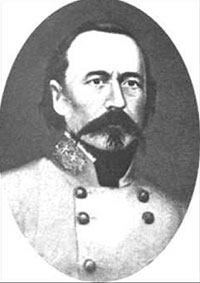
John Porter McCown (1815-1879)
Major General John Porter McCown was born in Tennessee in 1815, and graduated at West Point in 1840, with commission as second lieutenant of Fourth artillery.
He served in the removal of the Indians to the West in 1840, and on the frontier during the Canada border disturbances, 1840-41; in the military occupation of Texas, 1845-46, and in the Mexican war, 1846-47, being engaged in the battles of Palo Alto, Resaca de la Palma, Monterey, Vera Cruz, Cerro Gordo, and in the assault and capture of the City of Mexico. He was brevetted captain for gallant and meritorious conduct at Cerro Gordo.
After the Mexican war he served in various capacities, part of the time on frontier duty on the Rio Grande, being engaged in several skirmishes. On the January 9, 1851, he was commissioned captain of the Fourth artillery. He also served in Florida against the Seminole Indians, 1856-57.
When Tennessee seceded and cast her lot with the Confederacy, he resigned his commission on May 17, 1861 and was made lieutenant colonel of artillery in the Confederate army. His promotion was rapid; to colonel in May, 1861, brigadier-general, October, 1861, and major- general, March 1862.
His Southern assignments included: lieutenant colonel, Artillery (1861); colonel, Tennessee Corps of Artillery (May 17, 1861); commanding 2nd Brigade, 1st Geographical Division, Department #2 (September 7-October 24, 1861); brigadier general, CSA (October 12, 1861); commanding 3rd Division, lst Geographical Division, Department #2 (October 24, 1861-February 1862); commanding McCown's Command, lst Geographical Division, Department #2 (February-April 1862); major general, CSA (March 10, 1862); commanding division, Army of the West, Department #2 (April-July 1862); also commanding the army June 20-27 and July 20, 1862); commanding division, Department of East Tennessee (summer-December 1862); commanding the department (September 1- 19 and September 27-October 1862); commanding division, attached to Hardee's Corps, Army of Tennessee (December 1862-January 1863); and commanding division, Smith's Corps, Army of Tennessee (February-March 1863).
Initially in charge of the state's artillery, he commanded a brigade and then a division at Columbus, Kentucky. He did not however cross the Mississippi for the fight at Belmont but was sent up the east bank of the Mississippi with a force of infantry and artillery. He found no enemy threatening Polk's position, and the information thus obtained enabled Polk to send men enough across the river to insure victory at Belmont.
He commanded at New Madrid in March, 1862, but was assigned to duty elsewhere before the investment of that post by General Pope. He came in for severe criticism for his handling of the defense and withdrawal.
On June 20, 1862, he was assigned to command of the army of the West, Van Dorn taking department command. He led a division in the Corinth siege before being transferred to East Tennessee, sent to take command at Chattanooga just before the advance of Bragg to that point in 1862. He had command of a division in the army of Kentucky under Kirby Smith, and for a while in the fall of 1862, had charge of the department of East Tennessee. On the invasion of Kentucky he fought at Richmond and then was attached to Bragg's army. At Murfreesboro he and Cleburne formed the right of Hardee's corps, which fell upon McCook with such impetuosity as to sweep completely that part of the field, driving the Union left a distance of four miles, capturing cannon, small-arms, and thousands of prisoners. McCown's infantry and Wheeler's cavalry are spoken of in the reports as killing, wounding or capturing half the force in their front.
He then ran into trouble with Bragg, who brought charges against him for disobedience of orders. In February, 1863, he was arrested on charges of conduct prejudicial to good order and military discipline and sent to Chattanooga, where he was court-martialed on March 16, 1863, and was sentenced to six months' suspension from duty without pay. Afterwards he held only minor posts for the balance of the war.
At the close of hostilities he settled near Knoxville and engaged in school-teaching. He afterward settled at Little Rock, Ark., where he died January 22, 1879.